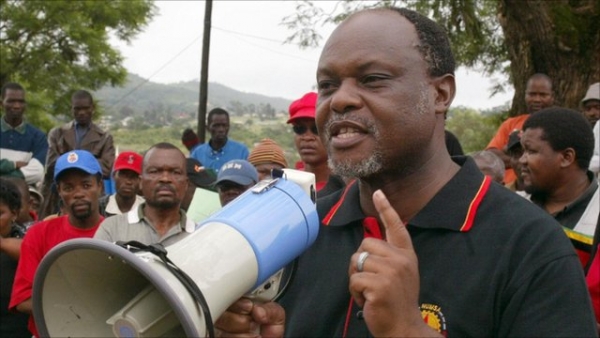South Africa’s questionable silence about human rights violations in Swaziland

The International Trade Union Confederation (ITUC), campaigning groups and labour supporting members of the European parliament this month launched protests about the continued harassment and jailing of trade unionists and democracy campaigners in Swaziland. ITUC general secretary Sharan Burrow has noted that, in Swaziland, “Violations against the fundamental rights of workers have become systemic.”
But apart from a few verbal sallies from non-governmental groups, there has been silence from South Africa. And this should be deeply worrying to those who are concerned about deepening democracy on the continent and in ensuring that a wealthy, often corrupt — if not entirely melanin deficient — elite do not continue to dominate.
Cosatu, embroiled in its destructive feuding, has been fairly quiet on this issue for some time. But, over the past decade or so, the federation has indulged in rhetorical flourishes and occasional, symbolic, border blockades that received some publicity, but no practical results.
This is, in fact, one of the arguments raised by those members of Cosatu unions who now doubt if the linkage of their organisations with the governing ANC was of any real use. There is broad agreement that, in the earlier years, some gains were made in terms of the labour laws. But even here there are arguments about whether this might have happened even with Cosatu outside of the alliance.
For many of these critics, the official attitude toward Swaziland today epitomises the hypocrisy of South Africa as a proclaimed beacon of democratic freedom and hope. Not only does the world’s last feudal monarch, Mswati III, continue to rule with autocratic impunity, he is also accepted and honoured as a national leader by South Africa, the region and the continent.
This was highlighted as the Easter weekend dawned, with its usual platitudes of peace, tranquility and hopes for a better future for all. It was then — and with this week’s 21st anniversary of the Rwandan genocide looming — that trade unionists and democracy campaigners in other parts of the world raised strongly the issue of Swaziland.
But there was little mention in South Africa of the gross human rights abuses, the detentions without trial, the beatings and harassment in one of this country’s closest neighbours. I admit a personal interest: I know and admire, Mario Masuku, president of the Peoples United Democratic Movement (Pudemo) who has been in detention for 11 months since having dared to address a workers’ May Day rally last year.
The Pudemo youth leader, Maxwell Dlamini was detained alongside Masuku. Then there is human rights and trade union lawyer, Thulani Maseko and journalist Bheki Makhubu who were sentenced last year to two years in prison for criticising the lack of independence in the judiciary.
The question then arises: does this matter to South Africa? And the answer is unequivocal: of course it does. And not just on a moral plane. If Swaziland erupts, the consequences for South Africa could be extremely serious.
So it is not just a moral question of doing the right, democratic thing. It is also a matter of self preservation, of retaining as much equilibrium as possible within the region as the struggle continues to seek a better future for all.
So why the silence? Why the apparent inability to act against a despot who fritters away, for his personal aggrandisement, what little wealth and aid his country has?
Could it be because of close ties at an elite level? President Jacob Zuma, for example, is engaged to one of Mswati’s sisters, and Mswati is the brother-in-law, twice over, to King Zwelithnini of the Zulu. Nelson Mandela’s grandson, Mandla, has also married into the Swazi royal family.
Such revelations, especially against the background of Zwelithini recently having his government grant increased to R57.6million a year, gives cause for concern. As a result, labour activists have every right to ask whether the “beacon of hope and democracy” is being dimmed by the acceptance of autocracy.
Support independent journalism
Donate using Payfast

Don't miss out on the latest news
We respect your privacy, and promise we won't spam you.
Next: Residents demand clarity on R60 million Langa Junction complex
Previous: How 1Life agent ripped off pensioners

This article is licensed under a Creative Commons Attribution-NoDerivatives 4.0 International License.
